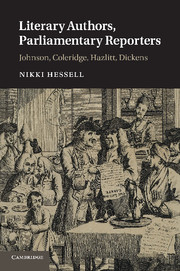Book contents
- Frontmatter
- Contents
- Acknowledgments
- Preface
- Chapter 1 Introduction: reporting and the individual talent
- Chapter 2 Samuel Johnson: beyond Lilliput
- Chapter 3 Samuel Taylor Coleridge and the freedom of the gallery
- Chapter 4 William Hazlitt and the real eloquence of the British Senate
- Chapter 5 Charles Dickens and the ghost of speeches past
- Chapter 6 Conclusion: taking parliamentary reporting seriously
- Bibliography
- Index
Chapter 1 - Introduction: reporting and the individual talent
Published online by Cambridge University Press: 05 November 2011
- Frontmatter
- Contents
- Acknowledgments
- Preface
- Chapter 1 Introduction: reporting and the individual talent
- Chapter 2 Samuel Johnson: beyond Lilliput
- Chapter 3 Samuel Taylor Coleridge and the freedom of the gallery
- Chapter 4 William Hazlitt and the real eloquence of the British Senate
- Chapter 5 Charles Dickens and the ghost of speeches past
- Chapter 6 Conclusion: taking parliamentary reporting seriously
- Bibliography
- Index
Summary
The literary careers of Samuel Johnson, Samuel Taylor Coleridge, William Hazlitt and Charles Dickens encompass a diverse range of genres, periods, influences and styles. But while their literary careers might not have much in common, their careers as parliamentary reporters share some compelling attributes. All four began reporting on Parliament at a relatively young age: Hazlitt was only thirty-four, Johnson and Coleridge were not yet thirty and Dickens was not yet twenty. All were drawn to parliamentary reporting as a source of income readily available to talented writers, but also appear to have had an ongoing fascination with both politics and oratory. None of the authors had established a literary reputation at the time they began reporting, with the partial exception of Coleridge, who nevertheless still had many of his major works ahead of him. All four were ultimately prolific journalists and, perhaps more importantly, understood the role that journalism played in supporting and developing a literary career.
There is one final significant connection between them: their parliamentary journalism has been subjected to very similar scholarly critiques over the past century. These critiques typically manifest at least one of the following characteristics. They evaluate the author’s reports with little or no reference to contemporary examples from other journalists. They do not take into consideration the conditions governing parliamentary reporting in the relevant period. They read the author’s reports with one eye on his later literary reputation and then, perhaps predictably, find the embryo of that reputation in the parliamentary journalism. Finally, and as a result of these approaches, they conclude that the author’s reports were special, memorable, transcendent.
- Type
- Chapter
- Information
- Literary Authors, Parliamentary ReportersJohnson, Coleridge, Hazlitt, Dickens, pp. 1 - 16Publisher: Cambridge University PressPrint publication year: 2011

